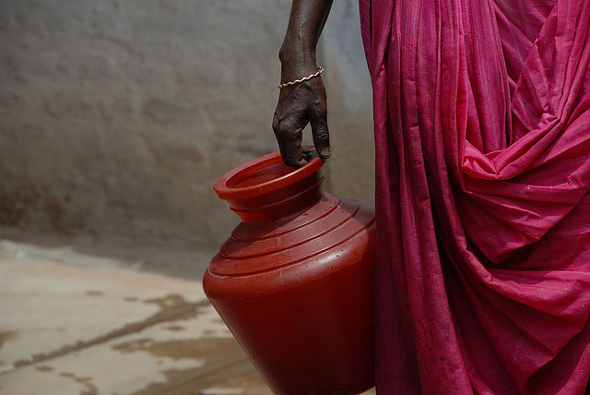-
Digging Deeper: Water, Women, and Conflict
September 27, 2011 By Theresa Polk
It’s not just “carrying water from a water point, but it’s discharging responsibilities that a woman has for using and managing water which may make her vulnerable to violence and bring her into risky areas,” said Dennis Warner, senior technical advisor for water and sanitation at Catholic Relief Services (CRS), at the Wilson Center on August 29. [Video Below]
“It’s really like peeling an onion, quite frankly. All of these issues are embedded within one another,” said Sandra Ruckstuhl, a senior social scientist at Group W Inc. Ruckstuhl and Warner were joined by Carla Koppell, USAID’s senior coordinator for gender equality and women’s empowerment to talk about the relationship between gender, access to water, and violent conflict.
Women: Water Users and Managers
The water for washing clothing, bathing, and general household use is often found in remote locations that may also be insecure. Women, who are primarily responsible for these activities, are therefore vulnerable to violence, including rape and kidnapping. This violence has far-reaching health, social, emotional, and economic impacts on the women themselves, but also has cascading effects on their households and communities.
Warner noted that the design of water systems frequently prioritizes technical efficiency and cost savings but fails to anticipate the vulnerability of women and children or other social considerations. “We need to institutionalize this knowledge on the protection of women in all development sectors, but especially in water, because water is such an obvious and leading edge of development that is subject to so many of these problems,” he said.
In planning water points, therefore, CRS attempts to both improve access and enhance protection of women and children. In Darfur, for example, by providing separate and more secure water points for pastoral and agricultural groups, they reduced both the risk to women and tension between groups.
Incorporating Social Factors
There is no linear progression from conflict to water access to gender dimensions that could lead to clear-cut interventions, said Sandra Ruckstahl; these issues “are nested within one another.” Citing case studies from India, the West Bank, and Gaza, she explored several factors that can impede water access in conflict situations, including the level of violence, state neglect, the role of non-state actors, and failure to build and/or maintain infrastructure. She also pointed to positive linkages, such as the case of Bosnia and Herzegovina, where an informal water management arrangement during the conflict created a foundation for post-conflict reconstruction.
Ruckstuhl indicated that access to water is “defined not just by physical and environmental factors, but also by social factors.” Therefore, interventions should be based on disaggregated data that analyzes the behaviors, priorities, and concerns of different user groups within a conflict area. Furthermore, practitioners should consider secondary impacts, including “other development implications, in terms of productive time for education or to contribute to the local economy.”
Gender Is Core Issue, Not a Sideline
“Too often when we are talking about issues related to women, or gender dimensions, within any development or conflict context, people think about it as a sideline,” said Carla Koppell. She emphasized the centrality of women to the conversation, both because they are profoundly vulnerable and because their vulnerability has a “ripple effect on the entire well-being of communities.”
According to Koppell, interventions should take into consideration the different roles of women and men, and how those roles evolve in conflict situations. She warned against viewing women solely as passive victims and emphasized the importance of leveraging women’s roles as leaders within their families and communities in the search for solutions.
“[W]hat we need to remember when we are talking about the nexus between water, conflict, and women, and I would say both women and gender issues as well, is that if we do a better job at building this into all of the interventions we’re working in…we will see better development results,” Koppell said. “I think we should all feel like this is quite core to our agenda…we should feel like it is a collective endeavor that we want to move forward together.”
Event Resources
Photo Credit: “Woman holding water vessel,” courtesy of flickr user waterdotorg.
Topics: conflict, development, From the Wilson Center, gender, global health, humanitarian, India, security, video, water
 A Publication of the Stimson Center.
A Publication of the Stimson Center.




